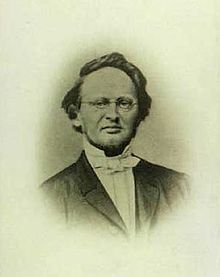Anders Sandøe Ørsted (botanist)
Anders Sandøe Ørsted | |
|---|---|
 | |
| Born | 21 June 1816 |
| Died | 3 September 1872 (aged 56) Copenhagen, Denmark |
| Alma mater | University of Copenhagen |
| Known for | Neotropical botany heteroecy of plant-pathogenic fungi Nematode systematics |
| Scientific career | |
| Fields | Botany |
| Institutions | University of Copenhagen |
| Doctoral students | Eugen Warming |
Anders Sandøe Ørsted, also written as Anders Sandoe Oersted or Anders Sandö Örsted (21 June 1816 – 3 September 1872) was a Danish botanist, mycologist, zoologist and marine biologist. He was the nephew of physicist Hans Christian Ørsted and of politician Anders Sandøe Ørsted.[1]
Career
In his early career, he published on Danish and Arctic nematodes[2][3] and on the zonation of marine algae in Øresund.[4]
Between 1845 and 1848, he travelled extensively in Central America and the Caribbean and published numerous papers on the flora, concentrating on the plant families Acanthaceae and Fagaceae.[5][6][7][8][9] One of his better known publications is L'Amérique Centrale.[10]
He was appointed professor of botany at the University of Copenhagen in 1851, a post he held until 1862. He was succeeded by Ferdinand Didrichsen.
His studies of what has since been known as juniper-pear rust showed that this fungus annually switches between two hosts; Juniperus sabina is the primary (telial) host and pear, Pyrus communis, is the secondary (aecial) host. He thus was the first to discover that some plant-parasitic fungi are heteroecious.[11] These studies were continued on other Gymnosporangium species.[12]
The orchid genus Oerstedella Reichenbach f. is named for him.
He is the author of several hundred plant names still in use.[13]
References
- ^ Spärck, R. (1932) Anders Sandöe Örsted, pp. 128-130 in: Meisen, V. Prominent Danish Scientists through the Ages. University Library of Copenhagen 450th Anniversary. Levin & Munksgaard, Copenhagen.
- ^ Ørsted, A.S. (1843) Grønlands Annulata dorsibranchiata. Kongelige Danske Videnskabernes Selskab, Naturhistorisk- mathematiske Afhandliger 10: 153-216.
- ^ Ørsted, A.S. (1843) Annulatorum Danicorum Conspectus. I. Maricolæ. Hafniæ, Sumtibus Librariæ Wahlianæ, 1843.
- ^ Ørsted, A.S. (1844) De regionibus marinis: Elementa Topographiae Historiconaturalis Freti Oeresund. Respondente ornatissimo E. Petit; publice defendere studebit A.S. Ørsted. J.C. Scharling, Copenhagen.
- ^ Ørsted, A.S. (1861) Myrsineae centroamericanæ et mexicanæ. Videnskabelige Meddelelser fra den Naturhistoriske Forening i Kjøbenhavn.
- ^ Ørsted, A.S. (1858) Gesneraceæ centroamericanæ. Kongelige Danske Videnskabernes Selskabs Skrifter - Naturvidenskabelig og Mathematisk Afdeling, 5. Rk., vol. 5.
- ^ Ørsted, A.S. (1855) Mexicos og Centralamerikas Acanthaceer. Videnskabelige Meddelelser fra den Naturhistoriske Forening i Kjøbenhavn 1854.
- ^ Ørsted, A.S. (1852) Centralamerikas Rubiaceæ (Bestemmelser og Beskrivelser mestendeels af G. Bentham). Journal of the Linnean Society 1852.
- ^ Ørsted, A.S. (1867) Recherches sur la classification des Chênes. Mémoires de la Societé d’Histoire Naturelle de Copenhague 1867.
- ^ Ørsted, A.S. (1863) L'Amérique Centrale: Recherches sur sa flora et sa géographie physique Archived September 30, 2007, at the Wayback Machine. Copenhagen, Bianco Luno
- ^ Ørsted, A.S. (1863) Om Sygdomme hos Planterne, som foraarsages af Snyltesvampe, navnlig om Rust og Brand og om Midlerne til deres Forebyggelse. Copenhagen.
- ^ Ørsted, A.S. (1866) Indpodningsforsøg, hvorved det bevises, at der finder et Generationsskifte Sted mellem den paa Enens Grene snyltende Bævrerust (Podisoma juniperinum) og den par Rønnens Blade voxende Hornrust (Roestelia cornuta). Resumé: Nouvelles observations sur un champignon parasite etc. Bulletin de l'Académie Royale des Sciences et des Lettres de Danemark 1866.
- ^ IPNI list of plant names with Oerst. as author.
- ^ International Plant Names Index. Oerst.